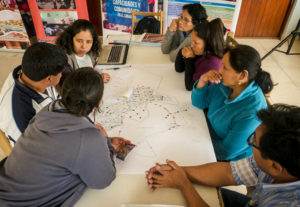Creating impact for long-term system change
In this series, we’re sharing six stories from our 2020-21 annual report that demonstrate the impact we’ve achieved in different contexts and at different scales. From a pilot project that’s set to overturn the status quo of urban migration in Kenya, to a partnership that’s already changed the game for millions in flood-prone areas around the world – and is set to do even more…
Our work as part of the Zurich Flood Resilience Alliance shows what’s possible when we start with a clear idea of the big change we want to achieve then develop and refine our approach as we learn what works. As our learning grows, we replicate elements of our solutions in different contexts and locations, adapting all the while and never losing sight of our commitment to long term systemic change.

Community-led design is at the heart of the work of the Zurich Flood Resilience Alliance.
The challenge
Flooding affects an average of 250 million people per year. More than any other natural hazard. Across the world, climate change, growing populations and unsustainable land use are increasing flood risk. And when an area floods, it’s the poorest communities who suffer the most.
Our goal
Our goal is to work with flood-prone communities to make resilience a way of life. We’ll do this by advising people how to adapt to a changing climate by putting plans and system changes in place to predict disasters and minimise their impact. We aim to reach 4 million people by 2025.
What we achieved in 2020/21
We’ve been part of the Zurich Flood Resilience Alliance since 2013. At the start of the reporting period, this partnership had already reached over 225,000 people directly across 13 programs in nine countries. The Alliance expanded to new countries in 2020/21 – Zimbabwe, Senegal and Bolivia. It also increased in scope, to more urban environments and heat resilience, and in terms of influence.
We introduced digital technology to help local volunteers monitor, predict and evacuate their communities as early as possible before floods happen. And we provided the tools and knowledge that residents and local business owners need to increase their resilience to future floods, so that they can invest in future success.
In Peru, our Early Warning System work which initially benefitted 10,000 people, has been used as evidence in the national approach. We have influenced the government to invest over £10 million in developing early warning systems, to reduce the risk to lives and livelihoods of people vulnerable to flood risks.
Our work with partners in 2020/21 means that 221,000 more people are protected by early warning or climate information services.
“Practical Action and the Z Zurich Foundation have been working in partnership since 2008. In 2021, we have extended our work together further in Peru and Nepal and started new work in Zimbabwe and Bolivia, focused on supporting communities to develop resilience in the face of increased flood risks. I’m delighted that we can continue on our journey together helping some of the most vulnerable people in the world shape a more climate resilient future.”
David Nash, Climate Change and Partnerships Senior Manager at Z Zurich Foundation
Future work
We’re expanding the reach of our work in partnership with the Zurich Flood Resilience Alliance. This means supporting more people to deal with more climate related hazards in more contexts. For example, we plan to extend our expertise to urban environments.